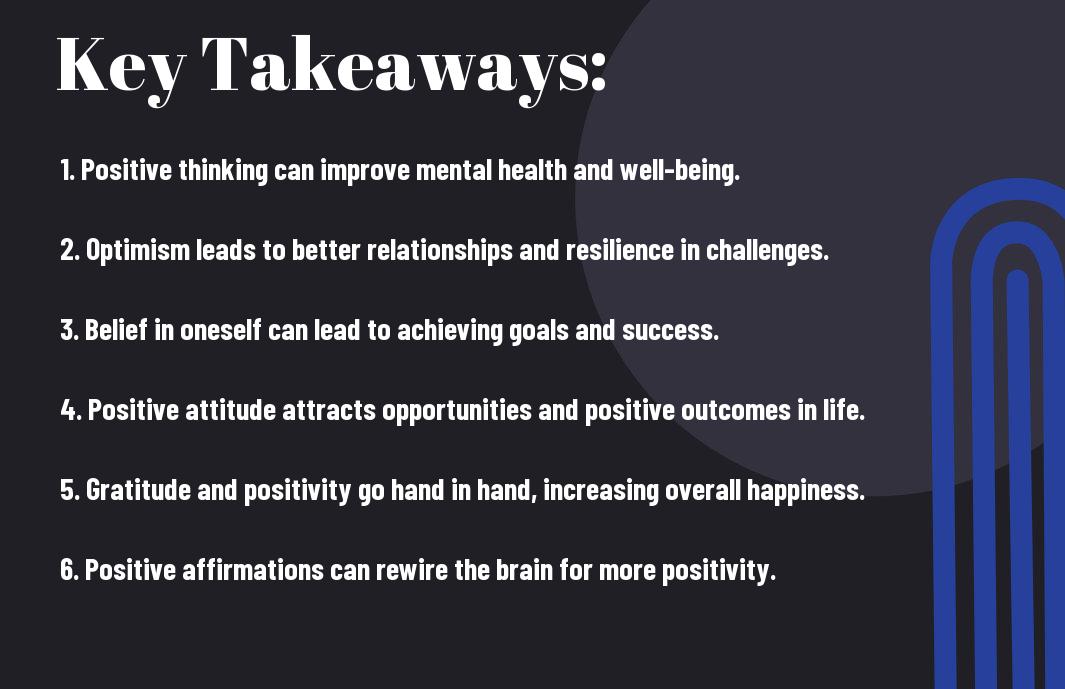Inspiring individuals who have harnessed the power of positive thinking have shown time and time again that a positive mindset can lead to incredible outcomes. This blog post will investigate into real-life examples of how positive thinking has transformed lives, overcome challenges, and created opportunities. From overcoming adversity to achieving dreams, these stories will showcase the impact of positive thinking on our mental well-being and overall success. Prepare to be inspired and motivated by the power of positive thinking as we explore the transformative potential it holds.
Key Takeaways:
- Positive thinking can lead to success: The stories and real-life examples highlighted in the article demonstrate how a positive mindset can open doors to opportunities and success.
- Focus on solutions, not problems: Positive thinking encourages individuals to shift their focus towards finding solutions rather than dwelling on problems.
- Improved mental and physical health: Maintaining a positive outlook can have a direct impact on both mental and physical well-being, leading to reduced stress levels and overall better health.
- Enhanced relationships: Positive thinking can help improve relationships by promoting empathy, understanding, and effective communication.
- Resilience in the face of challenges: By adopting a positive attitude, individuals can develop resilience to overcome obstacles and bounce back stronger from setbacks.

The Science Behind Positive Thinking
Neurological Effects of Positivity
Any effective discussion on the power of positive thinking must consider the science behind it. Science has shown that positive thinking can have profound effects on the brain. When we think positively, our brain releases feel-good chemicals like dopamine and endorphins, which can boost our mood and overall sense of well-being.
Moreover, positive thinking can lead to changes in the brain’s neural pathways, strengthening the areas associated with happiness and resilience while weakening those linked to stress and negativity. This means that practicing positivity regularly can actually rewire our brains for a more optimistic outlook on life.
Psychological Benefits of a Positive Outlook
Science tells us that there are numerous psychological benefits to maintaining a positive outlook. Studies have shown that individuals with a positive mindset are better equipped to cope with stress, have lower rates of depression and anxiety, and even enjoy better physical health overall. Embracing positivity can also enhance our creativity, decision-making skills, and ability to build strong relationships.
One exciting aspect of cultivating a positive outlook is the concept of neuroplasticity, which suggests that our brains have the ability to adapt and change throughout our lives. By actively practicing positive thinking, we can literally reshape our brains to become more resilient, optimistic, and better equipped to handle life’s challenges.
Historical Figures and Positive Thinking
Positive thinking has been a powerful force throughout history, shaping the lives and actions of many influential leaders. These figures demonstrated how a positive mindset can lead to remarkable achievements and inspire others to follow in their footsteps.
Influential Leaders and Their Positive Mindsets
Figures like Mahatma Gandhi, Nelson Mandela, and Martin Luther King Jr. are renowned for their unwavering belief in the power of positivity. They faced immense challenges and opposition, yet their commitment to non-violence, equality, and justice never wavered. Through their positive mindsets, they were able to galvanize movements, bring about social change, and leave a lasting impact on the world.
By maintaining a positive outlook in the face of adversity, these leaders were able to stay focused on their goals, inspire others to join their cause, and ultimately bring about positive change in society.
Overcoming Adversity Through Optimism
Any challenges can be overcome with the power of optimism. Historical figures like Helen Keller, who overcame deafblindness to become a renowned author and activist, exemplify the transformative impact of a positive mindset. Despite facing seemingly insurmountable obstacles, Keller’s optimism and determination propelled her to achieve incredible feats and become an inspiration to all.
A positive outlook not only helped Keller overcome her personal struggles but also empowered her to advocate for others with disabilities, leaving a lasting legacy that continues to inspire people today.
Modern Examples of Positive Thinking
After Aging Gracefully: The Power of Positive Thinking, it is evident that a positive mindset can truly transform lives and inspire others. In today’s fast-paced and often stressful world, maintaining a positive outlook can make all the difference in navigating life’s challenges with grace and resilience.
Success Stories in Business and Entrepreneurship
Thinking positively is not just beneficial for personal well-being but also for achieving success in the competitive business world. Entrepreneurs like Elon Musk and Indra Nooyi are prime examples of individuals who attribute their success to their unwavering optimism and belief in the power of positive thinking. Despite facing numerous setbacks and obstacles, they maintained a can-do attitude that propelled them to great heights.
Positive thinking in business is not just about wishful thinking; it involves strategic decision-making, resilience in the face of failure, and the ability to adapt to changing circumstances. By focusing on solutions rather than problems, successful entrepreneurs harness the power of positive thinking to turn their visions into reality and create lasting impact.
Positive Thinking in Sports and Athletics
Positive thinking plays a crucial role in sports and athletics, where mental resilience is often the key differentiator between victory and defeat. Athletes like Michael Phelps and Serena Williams are prime examples of individuals who credit their success to a positive mindset. By visualizing success, staying focused under pressure, and maintaining self-belief, they have achieved remarkable feats in their respective sports.
Stories of athletes overcoming insurmountable odds through the power of positive thinking serve as a testament to the impact of mindset on performance. By cultivating a winning mentality, athletes can push past their limits, bounce back from setbacks, and achieve extraordinary results that defy expectations.
Strategies for Cultivating Positivity
Mindfulness and Meditation Practices
To cultivate positivity, one powerful strategy is to engage in mindfulness and meditation practices. Mindfulness involves being fully present and aware of your thoughts, feelings, and surroundings without judgment. This practice can help you become more attuned to your emotions and learn to respond to them in a more constructive way. Meditation, on the other hand, allows you to quiet the mind and focus on the present moment, promoting a sense of calm and inner peace.
Regular practice of mindfulness and meditation can increase your resilience to stress, improve your overall well-being, and enhance your ability to stay positive in challenging situations. By taking the time to cultivate these practices, you can train your mind to see the good in every situation and approach life with a more optimistic outlook.
Cognitive Behavioral Techniques
To foster positivity, another effective approach is to utilize cognitive behavioral techniques. Cognitive behavioral therapy (CBT) is a form of psychotherapy that focuses on identifying and challenging negative thought patterns and replacing them with more positive and constructive beliefs. By learning to reframe negative thoughts and cultivate a more optimistic mindset, you can significantly improve your mental well-being and outlook on life.
The core principle of CBT is that our thoughts influence our feelings and behaviors, so by changing our thought patterns, we can effectively change how we feel and act. This approach empowers individuals to take control of their mental health and develop a more positive and resilient mindset in the face of challenges.
Challenges to Positive Thinking
Dealing with Negative Influences
On the journey to embracing positive thinking, one of the biggest challenges can be dealing with negative influences. These can come from various sources such as negative people in your life, pessimistic news, or even your own self-doubt. It’s important to recognize these influences and actively work to counteract them.
By surrounding yourself with positive and supportive individuals, limiting exposure to negative news or social media, and practicing mindfulness and self-affirmations, you can shield yourself from negative influences and maintain a positive mindset even in the face of adversity.
Overcoming Personal Obstacles
Obstacles within ourselves can often be the toughest to overcome when striving for positive thinking. These can include ingrained negative thought patterns, limiting beliefs, or past traumas that continue to affect our mental state. It’s crucial to address these obstacles head-on and work towards personal growth.
By seeking therapy or counseling, practicing self-care and self-awareness, and challenging negative beliefs with positive affirmations, you can begin to break free from the limitations holding you back and cultivate a positive and empowering mindset.
Overcoming Personal Obstacles: It’s important to remember that overcoming personal obstacles is a continuous process of self-discovery and growth. It may take time and effort, but with dedication and positive thinking, you can overcome these obstacles and transform your mindset for the better.
Conclusively
The power of positive thinking cannot be underestimated, as evidenced by the inspiring stories and real-life examples shared in this article. From overcoming challenges to achieving success, the impact of a positive mindset is clear. By adopting a positive attitude and outlook on life, individuals can navigate difficulties with resilience, attract opportunities, and create a fulfilling life for themselves. Embracing positivity can lead to personal growth, improved mental well-being, and enhanced relationships. Ultimately, cultivating a positive mindset is a powerful tool that can transform lives and pave the way for a brighter future.
FAQ
Q: What is the power of positive thinking?
A: The power of positive thinking refers to the mental and emotional approach that focuses on the bright side of life, expecting positive outcomes. It involves cultivating a mindset that believes in one’s ability to overcome challenges and achieve success.
Q: How can positive thinking impact your life?
A: Positive thinking can have a significant impact on your life by improving your overall mental well-being, boosting your confidence, enhancing your resilience to face obstacles, and attracting opportunities and positive experiences.
Q: What are some real-life examples of the power of positive thinking?
A: Real-life examples of the power of positive thinking include individuals who have overcome adversities, achieved their goals, and found happiness by maintaining a positive attitude, visualizing success, and persevering through difficult situations.
Q: How can one cultivate positive thinking in daily life?
A: To cultivate positive thinking in daily life, one can practice gratitude, affirmations, mindfulness, surround themselves with positive influences, set realistic goals, challenge negative thoughts, and focus on solutions rather than problems.
Q: Can positive thinking change your mindset and outlook on life?
A: Yes, positive thinking can change your mindset and outlook on life by helping you see situations from a different perspective, empowering you to take control of your thoughts and emotions, and enabling you to approach challenges with resilience and optimism.
Learn more:








